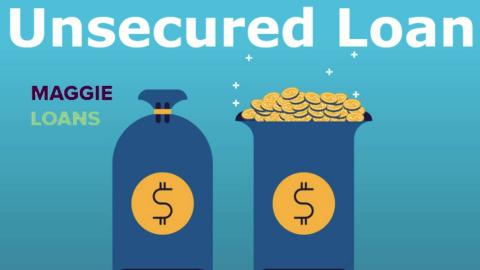
What is an Unsecured Loan?
An Unsecured Loan is a type of financing that does not require an asset as collateral in order for your financing application to be approved. While for a Secured Loan you must provide collateral such as a house or a car, with an Unsecured Loan you do not have to face the risk of losing your collateral. You can get an Unsecured Loan based on information about you. Lenders often pay attention to income, credit history, outstanding debts, and more. You can use the Unsecured Loan to cover any needs, but make sure you can repay the debt before applying.
How do Unsecured Loans work?
In order to get a loan, you just need to follow 3 simple steps:
- Submit your application. Study the offers of different lenders and compare them. After choosing the most profitable, visit the lender's website and apply.
- Wait for approval. As a rule, you will be able to receive a response to your application within one day. If you are approved, the lender will contact you to discuss the loan terms.
- Get paid. By signing a loan agreement, you can get a loan. Amounts are often transferred to bank accounts within one business day.
You should also know that banks and credit unions report in your payments to the three major credit bureaus. Thus, timely loan repayment will help you improve your credit history.
Personal loan Calculator
This calculation is just a representative example. The estimates are preliminary and may vary in some cases. You'd better get advice from a finance professional. Using this calculator isn’t a guarantee that you will be eligible for a loan. Your lender will need to approve you.
How much can I get with an Unsecured Loan?
The loan amount you can get may vary depending on the type of loan, the lender you choose, your credit history and the state where you live.
If you need a small Unsecured Loan, then you can apply for a Payday Loan. Payday lenders offer from $100 to $1000.
If you want to get a big amount, you can use Personal Loan or Installment Loan. These loans can be both secured and unsecured, but you will have no difficulty finding an Unsecured Loan. These lenders offer from $ 1000 to $ 35,000 or $ 50,000 dollars. You can even find loans up to $ 100,000.
What interest rates will I receive with an Unsecured Loan?
Interest rates often range from 6% to 36%. The APRs you receive often depend on your credit history. If you have good or even excellent credit, you can get from 10 to 12%. If you have a bad credit history, then most likely you will receive 28-30%. Annual APR also includes origination and other fees. The origination fee often ranges from 1 to 10% of the loan amount. Other fees may include prepayment fees and late fees.
Where can I get an Unsecured Loan?
In order to find the best loan offer, you must understand where you can get a loan. Such loans are provided by banks, credit unions and online lenders. Each option has its pros and cons, so it's important to compare offers and pay attention to interest rates, monthly payments, and more. Explore each option in more detail:
- Banks. Study if your bank offers Unsecured Loans. If you have a good or excellent credit history, then you can get a great deal. Banks often offer their clients with good credit lower rates and large loan amounts. However, please note that banks don’t have prequalification.
- Credit unions. Credit unions can be a good solution since they offer loans for bad credit. Moreover, federal credit unions limit APRs at 18%. But credit unions are also don’t have prequalification.
- Online lenders. Online lenders offer fast financing and same day approval. What's more, you can prequalify and get a loan without a hard credit check. Although these loans are the fastest and most convenient, they can come with high fees and interest rates.

